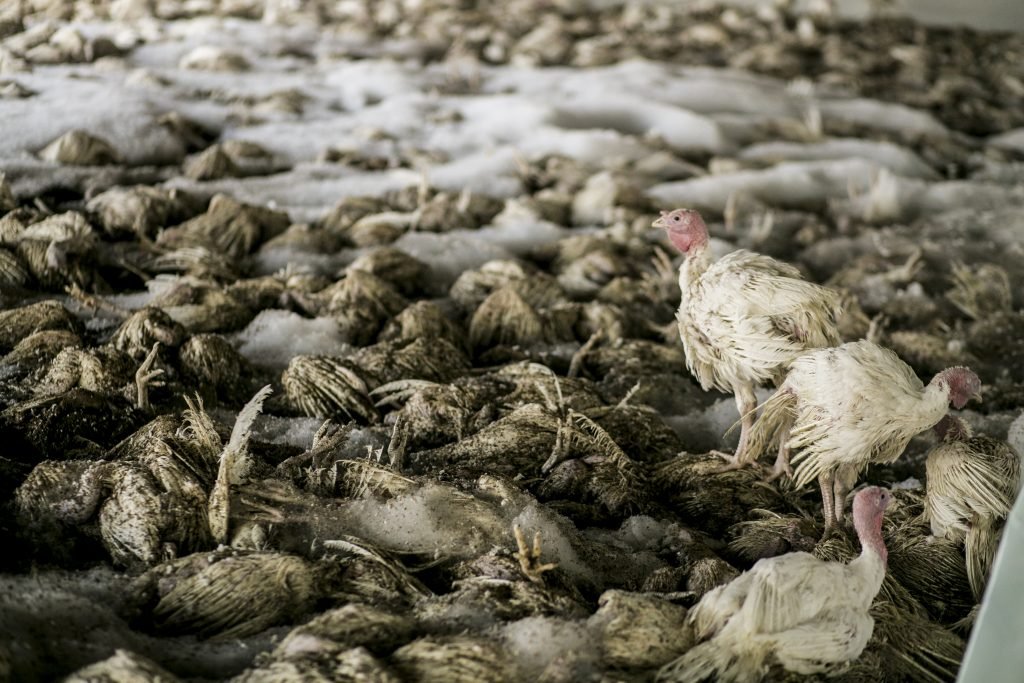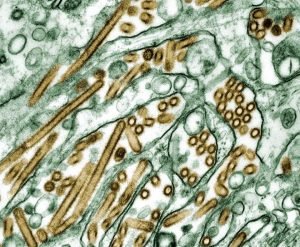Avian Influenza: Bird Flu

What Is Avian Influenza?
Infection of birds with the avian influenza Type A virus is referred to as avian influenza. These viruses are found in wild aquatic birds worldwide and can infect domestic poultry and other birds and animals. Avian influenza type A viruses can be found in wild aquatic birds’ intestines and respiratory tracts, but they rarely become ill. On the other hand, avian influenza A viruses are highly contagious among birds, and some strains can sicken and even kill domesticated birds such as chickens, ducks, and turkeys.
Learn More: Types Of Animal Diseases
Which Species Are Affected By Avian Influenza?
More than 100 wild bird species have been found to have avian influenza A viruses. The majority of these viruses were LPAI viruses. Terns, gulls, shorebirds, and waterfowl such as ducks, geese, and swans make up most wild birds from which these viruses have been found. These wild birds are frequently thought of as avian influenza A virus reservoirs (hosts). Other animal species that are susceptible to avian influenza include: 1Go To Source cdc.gov -“Avian Influenza in Birds”
- Ducks
- Whales
- Pigs
- Chickens
- Horses
- Seals
- Dogs
How Is Avian Influenza Spread?

Bird flu is a virus that can spread from wild waterfowl to domestic poultry like chickens, turkeys, ducks, and geese. Contact with an infected bird’s feces or secretions from its nose, mouth, or eyes transmits the disease.
Open-air markets, where eggs and birds are sold in crowded and filthy conditions, are hotbeds of infection and can spread the disease to the rest of the community.
Bird flu can be transmitted through undercooked poultry meat or eggs from infected birds. Poultry meat that has been cooked to an internal temperature of 165 degrees Fahrenheit is safe to eat. Cook eggs until the whites and yolk are both firm. 2Go To Source mayoclinic.org -“Bird flu (avian influenza)”
Can People or Pets Contract Avian Influenza?
Poultry products are only dangerous if they are eaten raw and come from infected birds (unprocessed). By eating infected raw poultry products or infected products from other bird species, cats and dogs may contract highly pathogenic avian influenza (HPAI).
The most common strain of bird flu is H5N1. It is fatal to birds, and humans and other animals who come into contact with a carrier are at risk. The virus is currently unknown to spread through human-to-human contact. Nonetheless, some experts are concerned that H5N1 could become a pandemic threat to humans.
What Are The Visual Signs Of Avian Influenza?
Influenza is a respiratory virus, and birds/poultry infected with it may display respiratory symptoms such as coughing and wheezing. There may also be nasal discharge, which may be tinged with blood in some cases.
Birds infected with avian influenza frequently act differently than they did before they were infected. They may appear depressed or inactive, and they may eat and drink less than usual. The birds may also become uncoordinated and incapable of standing or walking normally.
Physical signs of avian influenza in birds are visible. The feathers of poultry can become ruffled, and the combs and waddles can turn a bluish-purple color. Combs, waddles, hocks, eyelids, and heads may all experience swelling.
Symptoms Of Avian Influenza In Humans

- Fever
- Headache
- Eye Infections
- Diarrhea.
- Cough
- Muscle Aches
- Tiredness
- Nausea And Vomiting
- Sore Throat
- Runny Nose
Signs Of Avian Influenza In Animals
Avian influenza-infected poultry will appear depressed, have ruffled feathers, and refuse to eat. Watery diarrhea in birds can start out bright green and then turn white. The combs and wattles swell and sometimes turn blue. Swelling around the eyes and neck is possible. Pinpoint hemorrhages in the legs are possible. Egg production decreases and eventually ceases. Rarely, the brain can be affected, resulting in twisted heads, circling, or paralysis. Your pet may die unexpectedly without showing any symptoms. Infected mammals will develop a fever, cough, and difficulty breathing, and some will die. 3Go To Source cfsph.iastate.edu -“Avian Influenza Bird Flu”
How Harmful Is Avian Influenza?
Bird flu can lead to serious complications and even death in some cases. Some people are more susceptible to serious illness than others, just as they are with seasonal flu. Pregnant women, elderly people 65 and older, and those with weak immune systems should be wary of avian influenza.
Antiviral medications can help to lessen the severity of the illness. They may also help people who have been exposed to the flu avoid getting sick. Currently, no vaccine is available to the general public. The government has a vaccine for one type of H5N1 bird flu virus and could distribute it if an outbreak spreads easily from person to person. 4Go To Source medlineplus.gov -“Bird Flu Also called: Avian flu, Avian influenza, H5N1, H7N9”
How To Avoid Contracting Avian Influenza?
Currently, the best way to avoid avian influenza A virus infection is to stay away from sources of exposure whenever possible. Infected birds transmit the avian influenza virus in their saliva, mucous, and feces. When enough virus enters a person’s eyes, nose, or mouth or is inhaled, human infections with bird flu viruses can occur. This may happen when a person breathes in the virus that is in the air (in droplets or possibly dust) or when a person touches something with a virus on it and then touches their mouth, eyes, or nose.
If your property is infested with nuisance birds, it is possible they could be carrying avian influenza. Contact a wildlife removal company to rid your property of these pests. Wild birds may spread the disease to humans and pets through their feces. Animal removal technicians can ensure the complete clean-up of bird droppings and ensure your property is safe to enjoy.
What To Do If You Have Avian Influenza?
Bird flu can manifest itself in a variety of ways. As a result, treatment options may differ. Antiviral medications can help reduce the disease’s severity in most cases. If you believe that you’ve contracted avian influenza, contact a physician right away.
Birds around your home can be the reason you’ve contracted avian influenza. Contact a wildlife removal expert to trap some of the birds and have them tested. The removal technician will also implement strategies to deter birds from your property and clean up any excrement left behind.
Sources:
- CDC. “Avian Influenza in Birds | Avian Influenza (Flu).” Centers For Disease Control And Prevention, U.S. Department of Health & Human Services, 6 Feb. 2017, www.cdc.gov/flu/avianflu/avian-in-birds.htm#:%7E:text=Avian%20influenza%20A%20viruses%20have,as%20ducks%2C%20geese%20and%20swans.
- Mayo Clinic Staff. “Bird Flu (Avian Influenza) – Symptoms and Causes.” Mayo Clinic, Mayo Foundation for Medical Education and Research, 13 Nov. 2020, www.mayoclinic.org/diseases-conditions/bird-flu/symptoms-causes/syc-20368455#:%7E:text=Bird%20flu%20occurs%20naturally%20in,its%20nose%2C%20mouth%20or%20eyes.
- “Avian Influenza Bird Flu.” The Center For Food Security & Public Health, Iowa State University, www.cfsph.iastate.edu/FastFacts/pdfs/avian_influenza_F.pdf. Accessed 22 Mar. 2021.
- “Bird Flu.” Influenza A | Avian Flu | MedlinePlus, U.S. National Library of Medicine, medlineplus.gov/birdflu.html. Accessed 22 Mar. 2021.
